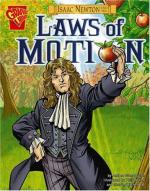|
This section contains 2,096 words (approx. 7 pages at 300 words per page) |

|
Earthly and heavenly motions were of great interest to Newton. Applying an acute sense for asking the right questions with reasoning, Newton formulated three laws which allowed a complete analysis (mathematical) of dynamics, relating all aspects of motion to basic causes, force and mass. So great was Newton's work that it is referred to as the first revolution in Physics.
First law of motion
Galileo's observation that without friction a body would tend to move forever challenged Aristotle's notion that the natural state of motion on Earth was one of rest. Galileo deduced that it was a property of matter to maintain its state of motion, a property he called inertia. Newton, grasping the meaning of inertia and recognizing that Aristotle's reference to what keeps a body in motion (outside influence) really should have been what changes a body's state of motion...
|
This section contains 2,096 words (approx. 7 pages at 300 words per page) |

|


